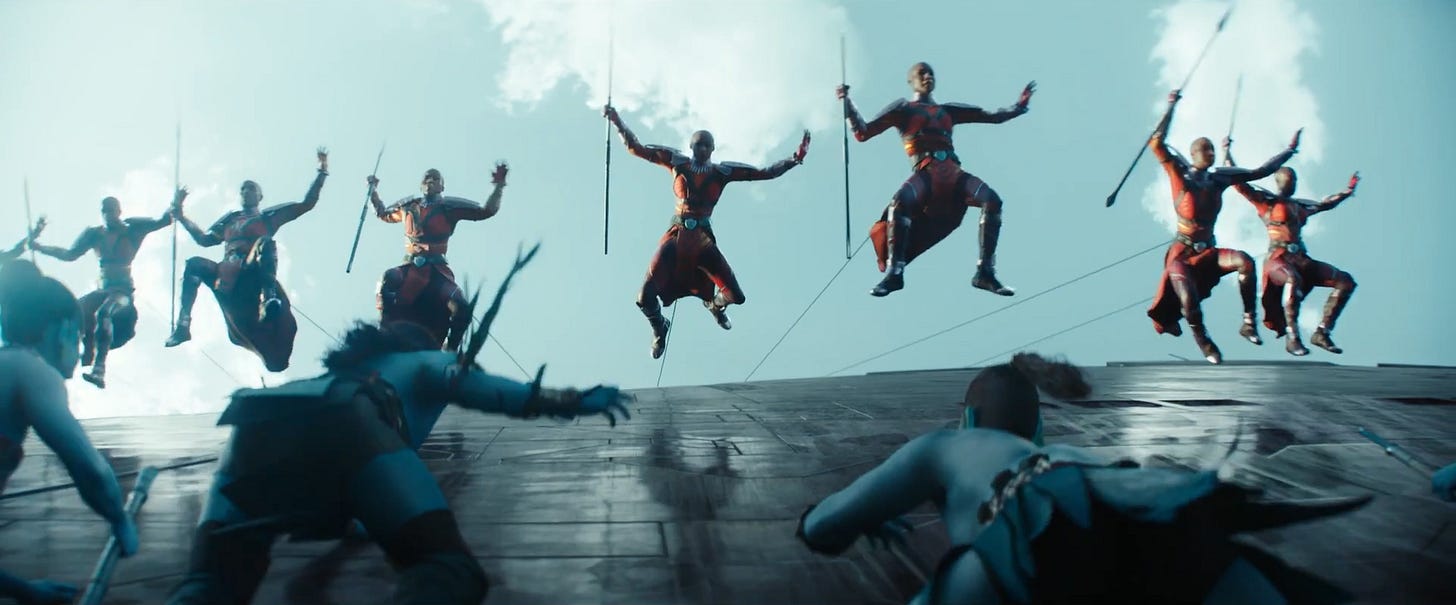‘Black Panther: Wakanda Forever’ Review
‘Forever’ being the operative word.

Black Panther is a top-tier Marvel movie for two reasons. Reason the first: Efforts to integrate it into the broader Marvel Cinematic Universe were limited, thus allowing for a more focused story that never felt long despite that picture’s 135-minute runtime. Reason the second: That picture’s villain, Killmonger (Michael B. Jordan), was not only incredibly charismatic, he also had an interesting (and, largely correct) ideological perspective on the nature of imperialism that put him directly into conflict with T’Challa (Chadwick Boseman) and Wakanda’s history of isolationism.
The film had weaknesses—foremost among them were the dodgy CGI during the climactic battle and the terrible green-screen work throughout—but its strengths easily overcame them.
Black Panther: Wakanda Forever seems to have taken the lessons from its predecessor’s success and thrown them right in the trash. Wakanda Forever is terribly bloated, and not just because writer/director Ryan Coogler (rightly) felt the need to pay tribute to Boseman, whose sudden death from colon cancer in 2020 shocked fans and filmmakers alike. It has fallen prey to Marvel’s first sequel curse, where characters and subplots designed to move the whole universe forward are shoved in for reasons that damage the film itself. (See also, Iron Man 2 and Thor: The Dark World.)
Hence the interminable subplot in this film involving CIA Director Valentina Allegra de Fontaine (Julia Louis-Dreyfus), who has popped up in a couple of Disney+ shows, and her entirely unclear efforts to either meddle in Wakandan affairs or maybe stop the U.S. government from meddling in Wakandan affairs? Hard to say. Don’t even get me started on the addition of Riri Williams (Dominique Thorne), who designs the Macguffin that powers the plot—a device that can detect vibranium and finds some under the ocean, thus revealing the existence of Namor (Tenoch Huerta) and his underwater kingdom of Talokan—but brings nothing to the table that the scientists and warriors of Wakanda do not already provide.
She is shoehorned into this story solely because she is Ironheart—basically, Girl Iron Man, coming soon to a Disney+ series on your flat screen—and the MCU overlords want to make sure lots of people see this new character in their sure-to-gross-a-billion-dollars hit. If Wakanda Forever feels like a slog—and it does, occasionally, feel quite slog-like; the new Black Panther isn’t revealed until two hours into the movie, for God’s sake—well, that’s at least part of the reason why.
But it’s not the whole reason. Some blame also needs to be placed on the nonsensical tension between Wakanda and Talokan. As the film begins, Wakanda is complaining to the United Nations about the dread colonial powers sending what appear to be SEAL teams after vibranium-filled outposts; once Talokan is revealed, Namor tells Queen Ramonda (Angela Bassett) and Princess Shuri (Letitia Wright) that Wakanda must join the underwater kingdom in wiping out every other land-based nation or be the first to fall from Talokan’s might.

Wakandans vs. Talokans. (Photo courtesy of Marvel Studios. © 2022 Marvel.)
Again, one reason that Black Panther succeeded is that it had an interesting idea at its core: Was Killmonger right that Wakanda’s decision to keep itself hidden as Africa was carved up by colonial powers fundamentally immoral and did Wakanda have a duty to better the descendants of the African diaspora? Even if he was wrong in his specific solution to this problem, he was ultimately right insofar as by film’s end, T’Challa agrees that his nation’s isolationism is iniquitous. Wakanda must become a global power to improve the lot of the globe’s oppressed people.
Wakanda Forever could have taken this idea a step further by demonstrating the responsibilities that accompany becoming an international superpower. Instead of examining this, the filmmakers retreat, portraying Wakanda not as an emerging power but, rather, as a nation beset on all sides. By the wicked colonizers, yes, but also by Talokan. That second conflict, frankly, doesn’t make a great deal of sense. There’s just no reason for Namor to attack the Wakandans. A more interesting movie might have asked how Wakanda would respond if, say, New York City were flooded by Talokan without warning and Americans begged for aid. Would they stand idly by as a vibranium-powered foe, Wakanda’s biggest fear, embarked on world conquest merely because the vibranium-powered aggressors are the descendants of a colonized people? Or would Wakanda accept its place as enforcer of global freedom, defender of the downtrodden?
Ah well. Perhaps something to be explored in an episode of What If …?
Wakanda Forever has its pleasures. The opening and closing are suffused with love for Boseman; you can feel the struggle all involved had when trying to return to this world. Bassett is regal as the long-suffering Queen Ramonda, and Winston Duke remains delightfully amusing as the big, brash M’Baku, leader of the Jabari tribe. The underwater city of Talokan is interesting to look at, though it would’ve been nice if we could actually see it a bit better: Black Panther: Wakanda Forever is a muddy mess, frequently too dark, too poorly lit. The large-scale CGI is a bit better this time around, but still pretty dodgy. As spectacle, it only intermittently works; one wonders how it will compare to Avatar: The Way of Water next month.
Wakanda Forever is by no means the worst movie that Marvel has ever made. But it is certainly among the most disappointing.


